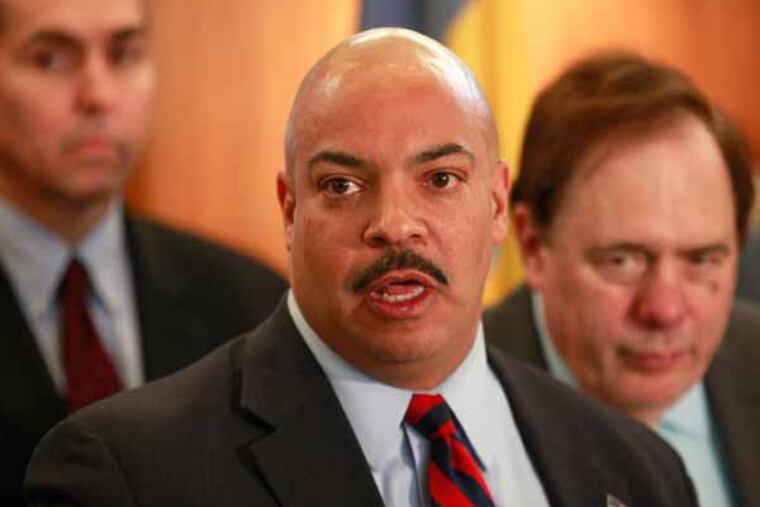Phila. DA assembles team to investigate corruption
Philadelphia District Attorney Seth Williams has quietly assembled an elite team of veteran prosecutors to investigate public corruption. To staff the effort, Williams has hired prosecutors from the state Attorney General's Office who brought successful cases against senior political figures in both parties, including former House Speaker John M. Perzel.

Philadelphia District Attorney Seth Williams has quietly assembled an elite team of veteran prosecutors to investigate public corruption.
To staff the effort, Williams has hired prosecutors from the state Attorney General's Office who brought successful cases against senior political figures in both parties, including former House Speaker John M. Perzel.
Earlier this month, Williams received court approval to create a new investigative grand jury, which allows prosecutors to subpoena documents and compel testimony.
Williams, in an interview, said he did not have "specific targets in mind." But he said he had no doubt targets existed.
"Philadelphians think we turn a blind eye to political corruption in Philadelphia. I wanted them to know that we don't - and that we will not abdicate our responsibility of prosecuting the appropriate cases in Philadelphia," Williams said.
"I appreciate the U.S. attorney has done a lot of them in the past, as they should," he said, referring to federal prosecutors. "But they won't be the only game in town."
To help staff the Special Investigations Unit, Williams hired two former state prosecutors, Frank Fina and E. Marc Costanzo. They joined a previous hire, Patrick J. Blessington, who was also a colleague from the Attorney General's Office.
In addition to political corruption, Williams said the three could handle cases involving police violence or other serious investigations. In all, the Special Investigations Unit has seven prosecutors.
Williams is taking a different tack than his predecessor, Lynne M. Abraham. During her 18 years in office, Abraham carried out a number of high-profile corruption investigations, among them widespread theft at Philadelphia International Airport and allegations of abuses by PGW executives.
But Abraham repeatedly referred political corruption cases to state or federal prosecutors. She always defended the referrals, arguing that she had a potential conflict of interest if she sought to pursue fellow Democrats.
The new investigative jury is to be supervised by Common Pleas Court Judge Gary S. Glazer, according to a court order issued April 16 by Pamela P. Dembe, the president judge of Common Pleas Court.
Glazer, who will decide such key issues as the reach of subpoenas or the ground rules for testimony, was a federal prosecutor in Philadelphia for 11 years before he became a judge in 1991.
In 2006, Republican Tom Corbett, then state attorney general and now governor, created a Public Corruption Unit and named Fina chief deputy attorney general. Fina, who had served as head of the office's criminal prosecutions, had previously served as a county prosecutor and federal prosecutor.
In 2008, Fina's team used a grand jury to issue the sweeping indictment known as "Bonusgate," which accused Democrats in the state House of funneling $3.8 million in illegal payments to aides in return for campaign work. Former Democratic State Rep. Mike Veon and eight Democratic staffers were convicted.
The next year, Fina's team brought the "Computergate" cases, which accused Perzel of spending more than $10 million of taxpayer money to develop software to help Republicans win election. Convicted in the scheme were Perzel, the veteran politician from Northeast Philadelphia; former Republican State Rep. Brett O. Feese; and six GOP aides.
Most recently, Fina helped investigate and prosecute Jerry Sandusky, the Penn State child molester.
Fina resigned as a state prosecutor and accepted his new Philadelphia position in early January, a week before Democrat Kathleen Kane became attorney general.
Her election put Fina in a difficult position. During her campaign, Kane had complained that the 33-month Sandusky inquiry had dragged on too long and suggested that Corbett slowed it to avoid political embarrassment.
In February, Kane named a special deputy attorney general to review the investigation. Corbett has vigorously denied that politics played any role in the probe.
For Costanzo and Blessington, who declined to comment, the new job in Philadelphia marks a return home. Both began their careers as city prosecutors and both later became state prosecutors.
Williams called the trio "heavy hitters."
"I brought them in, gave them the keys to the car, and said, 'Take it wherever it takes you,' " he said.
Abraham's predecessor as district attorney, Ronald D. Castille, now chief justice of the state Supreme Court, created a municipal corruption unit. Using a grand jury as a tool, the unit mounted a series of successful cases, including one against a developer who stole more than $100,000 while rebuilding homes destroyed in the 1985 MOVE bombing.
John W. Herron, now a top city judge but then the unit's chief, said the grand jury was vital in compelling testimony from hostile or wary witnesses.
"The ultimate goal was cleaner, more honest, better government," Herron said. "If you don't have an active focus on that kind of corrupt practice in government, it oftentimes goes undiscovered, flies under the radar, and grows and grows."
Castille's forerunner as district attorney, Edward G. Rendell, focused on police misconduct and established a unit to pursue it.
L. George Parry, former chief of Rendell's squad, said Williams' team might face tough going in politicized Philadelphia courts.
"He deserves a lot of credit for bringing in these outstanding prosecutors to try and get the job done," Parry said. "The risk is, despite whatever good work they perform, their work product could very well be chewed to pieces in the Philadelphia court system. But the results could be tremendous."
On Friday, Rendell said Williams was right to join state and federal prosecutors in looking for possible corruption.
"Sadly," Rendell said, "there's enough to go around."
at 215-854-4821 or cmccoy@phillynews.com or follow @CraigRMcCoy on Twitter.